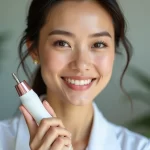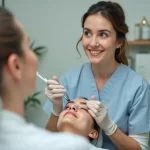Each hair string on your head has a life time between 3 to 5 years. Hair roots have a cycle of lively growth, modulation, and rest. Hair loss falls out when your hair’s growth routine is disrupted. Your genetics most normally stimulate hair loss and become familiar in men and women with time. The second most normal explanation is telogen effluvium. This state occurs when more of your fuzz gets in the rest cycle and starts falling. We can make Lifestyle Changes to Prevent Hair Thinning.
If you are going through hair loss that leads to bald patches, patchiness, or big balls of hair coming out, you had better see your familiar healthcare physician or a dermatologist for a better treatment. They will do some tests and check for Skin cancer screening so you can get the effective treatment and best results. Kindly continue to peruse for additional information about balding and its prevention.
How many types of hair loss exist?
A few types of hair loss last, although others last for a short time. The basic types of hair loss include:
- Androgenic alopecia: This genetic baldness can impact anyone (either in male pattern baldness or hair loss in females).
- Alopecia areata: Alopecia areata is an immune system problem that prompts balding from the scalp and body.
- Telogen effluvium: This kind of hair loss implies fast shedding of fuzz in a short period of time. It generally happens several months after your body gobbles up something truly or genuinely nerve-racking.
- Anagen effluvium: This super quick fluff loss occurs because of explicit clinical medicines, such as chemotherapy.
Is hair loss or hair thinning common?
Baldness (androgenic alopecia) is the basic kind of hair loss. It impacts approximately 80 million individuals. Hair loss is among the basic fallouts of chemotherapy. Alopecia areata has implications for up to 6.8 million people in the world. If you are in Phoenix, Arizona, then you will be able to get the best Hair loss treatment in Metro Phoenix.
Lifestyle Changes to Prevent Hair Thinning:
Lifestyle Changes to Prevent Hair Thinning can be done on your own before seeking medical help. Following a couple of hair hygiene points can improve your general hair wellness and possibly prevent hair loss.
1. Don’t tie your hair too tight:
Hair is bendable, but research indicates that your fuzz can only be stretched so much before becoming permanently busted. Hairdos such as cornrows, crooked braids, and ponytails can overstretch your hair off from your scalp and untie the bond between your fuzz and scalp with the passage of time.
2. Don’t use heat styling tools:
Utilizing heat to style your fuzz leaves your hair roots dried up and tender to damage. Blow dryers, hair straighteners, and curling rods can all damage your hair gradually by causing moisture to expand in your hair roots.
3. Don’t use chemicals or bleach for your hair:
Chemically dealing with hair with techniques such as decolorizing damages hair by breaking up protein molecules known as keratin. If you are interested in hair loss, restrict your utilization of dyes, highlights, hydrogen peroxide treatments, and curls.
4. Don’t use harsh shampoo for hair:
The shampoo is intended to clean your scalp of grease and extra oil. Excess washing with shampoo can possibly damage your hair. A few other elements have been related to crimp, scalp dryness, and weak hair.
There is no proof that some particular elements in shampoo cause hair loss; merely, they might contribute to less-than-perfect hair wellness. If you observe your hair is excessively dry or frizzy, seek a shampoo that is as close to all-natural as feasible. Most shampoos for balding expense not more around $30 and are not covered by insurance.
5. Always use a soft brush built from natural bristles:
Using a sensitive brush with normal strands might conceivably support healthy oil levels on your fuzz. The keratin proteins in your fuzz are piled like shakes on a roof, and so brushing them softly in a single direction, starting at the big top and carrying on through to the roots, can assist in smoothing and conditioning your scalp. Brushing hair every day can also help you avoid controlling hairballs in your shower waste pipe.
6. Use light therapy but at a low level:
Low-level light therapy boosts cell development and repair. It is a conceivably compelling treatment for basic baldness, the basic reason for ongoing baldness in people. These heritable circumstances cause a definite pattern of hair loss. For men, it starts at a fadeout hairline or uncovered fix at the top. For women, it is defined by a general thinning that frequently causes a more extensive part.
Do you want Hair loss treatment in Metro Phoenix, Arizona?
If you are related to hair loss that goes on the far side of normal dropping or short-term telogen effluvium, you had better speak to a physician. Hair that is coming out in balls and leaving overt spots and hair that is growing in spots could be symptoms of a basic wellness issue. Talk to a dermatologist at Mobile Skin Screening and identify your symptoms. You will be having the best Hair loss treatment in Metro Phoenix, AZ.
FAQs:
Q1: How does stress reduction impact hair thinning?
Ans: Stress reduction can help decrease hair thinning by lowering cortisol levels, which can contribute to hair loss.
Q2: What is the relationship between sleep quality and hair health?
Ans: Good sleep quality boosts hair wellness by supporting suitable follicle function and bringing down stress-related hair loss.
Q3: Can regular exercise help prevent hair thinning?
Ans: Yes, daily exercise can help prevent hair thinning by raising blood circulation and reducing stress levels.




